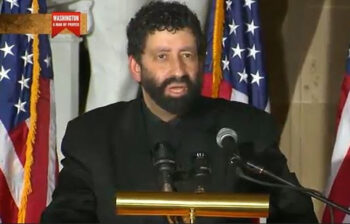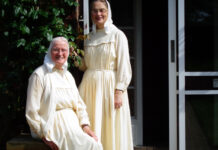By Charles Gardner —

The prodigious and insightful author Rabbi Jonathan Cahn asks the question, “Who is the most famous person to attend the annual Festival of Hanukkah?”¹
The answer, as too many perhaps don’t realize, is Yeshua. For in the Gospel of John, the apostle records: “Then came the Festival of Dedication at Jerusalem. It was winter, and Jesus was in the temple courts walking in Solomon’s Colonnade.” (John 10:22)
We are told there was conflict over his claims to be the Messiah, with some opponents even threatening to stone him. But his appearance there was significant.
The feast was inaugurated in 164 BC when the Maccabees finally defeated the much more powerful armies of the tyrannical Syrian-Greek emperor Antiochus Epiphanes IV who had tried to impose his pagan idolatry on the Jewish people.
He had desecrated the temple – even sacrificing a pig on the altar – but on December 25 that year (in the Gregorian calendar) God’s holy place was restored and cleansed, and it is said that the menorah burned miraculously for eight days despite having only enough oil for one.
So we remember that stunning military victory with a festival of light, symbolized by a special nine-branched candlestick, with a candle lit on each of eight days by the central Shammas (servant) candle.
Jesus came both as the light of the world and as a Servant King, humbly becoming a man and God’s sacrificial Lamb.
Antiochus mercilessly slaughtered 80,000 Jewish men, women and children in his bid to force his pagan ways on God’s people, many of whom compromised their faith in the face of such intimidation. But the Maccabees struck back.
And so it was that the temple re-dedication – Chanukah in Hebrew – paved the way for the coming of Messiah some 160 years later. Jesus, too, was to cleanse the temple with his presence while also inaugurating a new era when, through the Holy Spirit, individual disciples would each become temples of God’s presence after depravity and deceit was driven from their hearts and replaced with total devotion to their Lord and Master.
The fury vented against the Jewish people at the time of Antiochus is replicated in many respects by Hamas and its poison spreading across the globe in the wake of the October 7th massacre.
It is also true that now, as then, many Israelis have been lured into the Western world’s hedonistic lifestyle. However, I perceive a major turning back to the God of Israel, with the reality check that this is no time for looking to the strength and numbers of our horses and chariots, or for relying on Egypt (America?), but to trust only in the Lord (see Isaiah 31:1).
Hanukkah symbolizes restoration from a defiled and unclean way of life to a pure and holy devotion. It needs to be more than a feast this year, perhaps a turning point in the life of a nation called to be a light to the Gentiles.
My wife and I were encouraged this weekend to see a shop selling Judaica in the heart of north London, a defiant stand in the face of ongoing threats to the safety of Jewish people here.
Hanukkah is a lesson that selling out to worldly ways doesn’t pay. For God will always have the last word. Tragically, in the UK, we hear of plans for a ‘Rave in the Nave’ at Canterbury Cathedral, the supposed heart of Protestant Christendom.
The Cathedral Dean, in a bid to attract younger people, is planning to stage a disco-type party, fortified by alcohol, in these once hallowed premises. Gavin Ashenden, writing in the Catholic Herald, is appalled at how a sacred space is thus so frivolously being abandoned for secular entertainment.² It’s yet another example, in my opinion, of the ongoing desecration of holy institutions in the Christian West.
Yet I still hold out much hope, particularly as I see the full picture of the gospel presented with such depth and insight by a growing number of Messianic Jews like Jonathan Cahn and Jason Sobel. It goes part way to explaining why St Paul insisted that the gospel must be preached “to the Jew first” (Romans 1:16), I suspect because they somehow seem able to join the dots between the old and new testaments in a way that the rest of us often miss.
This is especially the case when talking of the feasts, and how they connect indelibly with the New Testament revelation of Jesus.
My advice to the Dean of Canterbury is to return to a Spirit-empowered preaching of the gospel focused on Jesus, the Servant King and light of the world, whose offer of “life in all its fulness” (John 10:10) is bound to draw seeking young people to his beauty and grace, as it did so surely with me 51 years ago, when I was just 22.
We need to chuck out the garbage in our lives and re-dedicate ourselves to our divine destiny. The antisemitic poison being spewed out on our streets, like the reign of terror preceding Hanukkah, is surely a precursor to a revival among God’s people everywhere, and to increasing reconciliation between Jews and Gentiles.
The beautiful stones with which the magnificent structure at Canterbury was built were carved and fashioned through the inspiration of the one and only gospel of Christ – “a precious cornerstone for a sure foundation” (Isaiah 28:16).
¹ The Book of Mysteries, published by FrontLine
² Catholic Herald, December 2, 2023




Amen! Thank you for this article and for this reminder. I will be praying for God’s word preached fearlessly at Canterbury Cathedral and for the Holy Spirit to fall on many young people there. May the “rave” be replaced by a “revival!” Hallelujah!
Comments are closed.